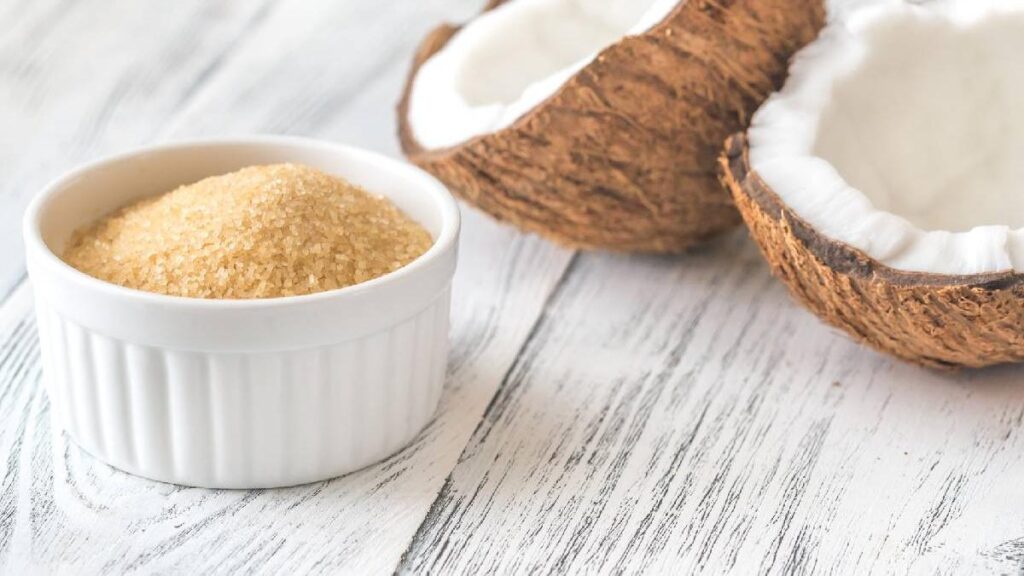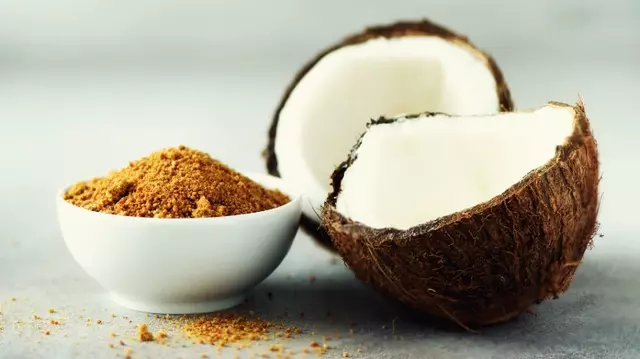In the search for healthier sugar alternatives, coconut flower sugar—also known as coconut sugar—has gained popularity as a natural, less-processed sweetener. Extracted from the sap of coconut palm flower buds, this golden-brown sugar is often marketed as a more nutritious substitute for white sugar, appealing to health-conscious eaters and those following plant-based or clean diets.
But is coconut flower sugar truly healthier than traditional sweeteners?
Let’s break it down.
🌴 What Is Coconut Flower Sugar?
Coconut flower sugar is made by collecting the sap from the flower buds of the coconut palm tree. The sap is then gently heated to evaporate the water, leaving behind a rich, caramel-colored granulated sugar. It looks and tastes similar to brown sugar, with a deep flavor that resembles toffee or butterscotch.
Unlike refined white sugar, coconut sugar is minimally processed and does not contain artificial additives or bleaching agents.
✅ Potential Health Benefits
- Lower Glycemic Index (GI)
Coconut sugar has a glycemic index of around 35–54, which is lower than white sugar (GI of ~65). A lower GI means it may cause a slower rise in blood sugar, though this effect can vary depending on the person and amount consumed. - Contains Trace Nutrients
Coconut sugar retains small amounts of iron, zinc, calcium, and potassium, as well as antioxidants. It also contains inulin, a type of prebiotic fiber that may help improve gut health. - Less Processed
Unlike refined sugar, coconut sugar undergoes minimal processing and retains more of its natural compounds, which may offer added nutritional value.
⚖️ How It Compares to Other Sweeteners
| Sweetener | GI | Nutrients | Processing Level |
|---|---|---|---|
| Coconut Sugar | 35–54 | Yes (trace minerals) | Low |
| White Sugar | ~65 | None | High |
| Honey | 58 | Yes (antioxidants, enzymes) | Low–Medium |
| Maple Syrup | ~54 | Yes (zinc, manganese) | Low |
| Agave Syrup | ~15 | Minimal | Medium |
| Stevia (natural) | 0 | No | Low |
Note: GI values may vary slightly depending on the source.
While coconut sugar offers more nutrients than refined sugar, it’s important to remember that it is still sugar—high in calories and best consumed in moderation.
🍰 How to Use Coconut Sugar
Coconut sugar can be used just like white or brown sugar in most recipes:
- Stir into coffee or tea
- Bake into cookies, cakes, or muffins
- Sprinkle over oatmeal or yogurt
- Add to sauces, marinades, or dressings
It has a caramel-like flavor that pairs well with baked goods and warm drinks.
⚠️ Things to Keep in Mind
- Calories Are the Same: Coconut sugar contains about 16 calories per teaspoon, similar to regular sugar.
- Not Suitable for Ketogenic Diets: Due to its carbohydrate content, it’s not recommended for low-carb or keto diets.
- Diabetics Should Still Be Cautious: Although it has a lower GI, it still impacts blood sugar.
📝 Conclusion: Is Coconut Flower Sugar Healthier?

Yes—and no. Coconut flower sugar may be marginally healthier than white sugar due to its lower glycemic index and small amounts of nutrients. However, it’s still a form of added sugar and should be used in moderation. Think of it as a better option, not a free pass.
If you’re looking to cut back on refined sugar but still want a touch of sweetness, coconut sugar can be a great natural choice to consider—especially if you appreciate its flavor and prefer less processed ingredients.
Have you tried coconut sugar in your baking or morning coffee? Let us know how you use it in the comments below! 🌴🍪

